仁爱英语九年级上册知识点归纳
仁爱版英语九年级上册知识点汇总

仁爱版英语九年级上册知识点汇总九年级上册(重点短语、句型和语法)Unit1 The Changing WorldTopic1 Our country has developed rapidly.【重点短语和句型】1. have a good summer holiday 暑假过得愉快2. come back from 从......回来3. have/has been to 去过4. have/has gone to 去了5. not...any more 再也不...6. take photos 照相7. by the way 顺便问一下8. take part in 参加9. around/all over/throughout the world 全世界10. tell X. something about... 告诉某人关于某事11. have/live a happy/hard life 过着幸福/困难的生活12. describe...in detail 详细描述13. give support to 支持...14. see...oneself 亲眼看见15. keep in touch with 与...保持联系16. far away 遥远的17. kinds/sorts of 各种各样的...18. not only...but also 不仅...而且...19. make progress 取得进步20. more than/over 多于21. develop/improve rapidly 迅速开展/改善22. tell X. (not ) to do sth. 告诉某人〔别〕做某事23. ask X. (not ) to do sth. 要求某人〔别〕做某事24. in order to do sth. 为了做某事25. have to do sth. 不得不做某事26. It's +形容词+for X. to do sth. 对于某人来说做某事是...的27. why not do sth.=wh y don’t you do sth为什么不做某事28. succeed/be successful in doing sth. 成功地做某事29. dream about doing sth. 梦想做某事30. see/hear X. do/doing sth. 看见/听见某人做/正在做某事【重点语法】现在完成时一. 现在完成时的根本结构肯定句:主语+have/has+Ved (动词的过去分词)+其他否认句:主语+have/has+not+Ved (动词的过去分词)+其他一般疑问句:Have/Has+主语+Ved (动词的过去分词)+其他特别疑问句:特别疑问词+一般疑问句语序〔have/has+主语+过去分词+其他〕,把划线词去掉二. 现在完成时的用法态发生在过去但它的影响现在还存在,强调的是现在。
仁爱版初三上册英语知识点总结
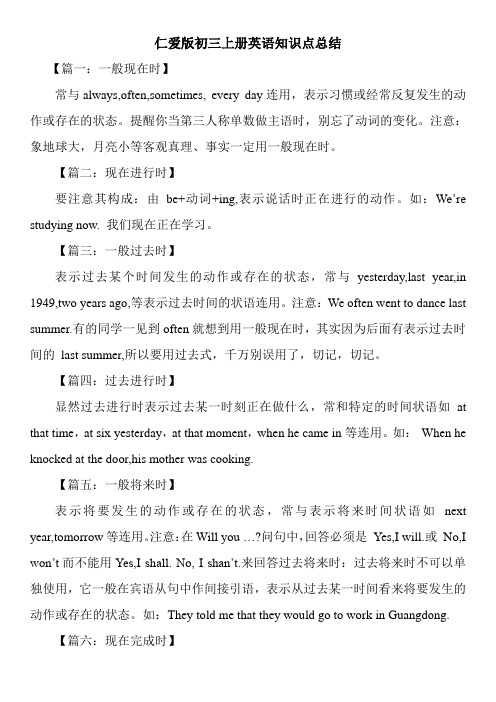
仁爱版初三上册英语知识点总结【篇一:一般现在时】常与always,often,sometimes, every day连用,表示习惯或经常反复发生的动作或存在的状态。
提醒你当第三人称单数做主语时,别忘了动词的变化。
注意:象地球大,月亮小等客观真理、事实一定用一般现在时。
【篇二:现在进行时】要注意其构成:由be+动词+ing,表示说话时正在进行的动作。
如:We’re studying now. 我们现在正在学习。
【篇三:一般过去时】表示过去某个时间发生的动作或存在的状态,常与yesterday,last year,in 1949,two years ago,等表示过去时间的状语连用。
注意:We often went to dance last summer.有的同学一见到often就想到用一般现在时,其实因为后面有表示过去时间的last summer,所以要用过去式,千万别误用了,切记,切记。
【篇四:过去进行时】显然过去进行时表示过去某一时刻正在做什么,常和特定的时间状语如at that time,at six yesterday,at that moment,when he came in等连用。
如:When he knocked at the door,his mother was cooking.【篇五:一般将来时】表示将要发生的动作或存在的状态,常与表示将来时间状语如next year,tomorrow等连用。
注意:在Will you …?问句中,回答必须是Yes,I will.或No,I won’t而不能用Yes,I shall. No, I shan’t.来回答过去将来时:过去将来时不可以单独使用,它一般在宾语从句中作间接引语,表示从过去某一时间看来将要发生的动作或存在的状态。
如:They told me that they would go to work in Guangdong.【篇六:现在完成时】顾名思义,现在完成时表示的是已经完成的动作,但动作造成的影响还在,常被just,already,yet 等副词修饰。
仁爱版九年级英语上册知识点汇总
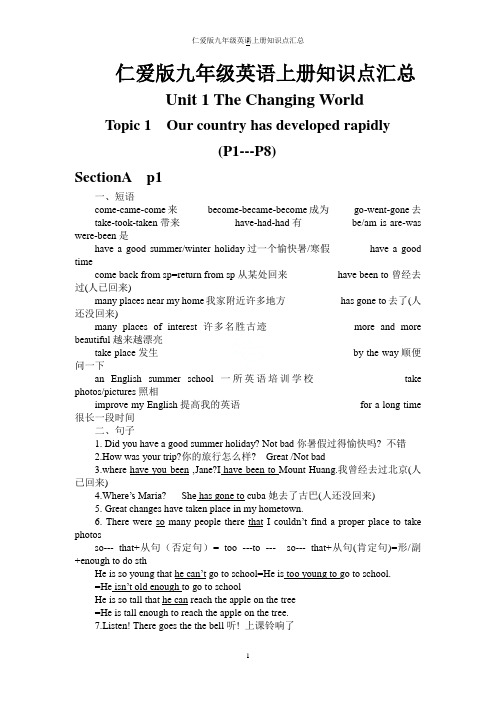
仁爱版九年级英语上册知识点汇总Unit 1 The Changing World Topic 1 Our country has developed rapidly(P1---P8)SectionA p1一、短语come-came-come来become-became-become成为go-went-gone去take-took-taken带来have-had-had有be/am is are-was were-been是have a good summer/winter holiday过一个愉快暑/寒假have a good timecome back from sp=return from sp从某处回来have been to曾经去过(人已回来)many places near my home我家附近许多地方has gone to去了(人还没回来)many places of interest许多名胜古迹more and more beautiful越来越漂亮take place发生by the way顺便问一下an English summer school 一所英语培训学校take photos/pictures照相improve my English提高我的英语for a long time 很长一段时间二、句子1. Did you have a good summer holiday? Not bad你暑假过得愉快吗? 不错2.How was your trip?你的旅行怎么样? Great /Not bad3.where have you been ,Jane?I have been to Mount Huang.我曾经去过北京(人已回来)4.Where’s Maria? She has gone to cuba她去了古巴(人还没回来)5. Great changes have taken place in my hometown.6. There were so many people there that I couldn’t find a proper place to take photosso--- that+从句(否定句)= too ---to --- so--- that+从句(肯定句)=形/副+enough to do sthHe is so young that he can’t go to school=He is too young to go to school.=He isn’t old enough to go to schoolHe is so tall that he can reach the apple on the tree=He is tall enough to reach the apple on the tree.7.Listen! There goes the the bell听! 上课铃响了8.sb have /has been to sp某人曾经去过某地(人已回来)sb have/has gone to某人去了某地(人不在说话者的地方)sb have /has been in sp某人呆在某地Section B P3Words:develop(v)----developing/developed(adj)-----development(n)发展发展中的/发达的发展/达;开发educate(v)---education(n)教育communite(v)---communication(n)交流decide(v)---decision(n) 决定feed-fed-fed喂,饲养do –did-done做shut-shut-shut关上chat-chatted-chatted聊天spend-spent-spent 花费feel-felt-felt感觉fall-fell-fallen掉learn-learned/learnt-learned/learnt学dream-dreamed/dreamt-dreamed/dreamt梦想tell-told-told告诉write-wrote-written写take part in+活动join+组织leisure /social /volunteer activities业余/社会/志愿活动be a volunteer成为一个志愿者disabled children’s home 一所残疾儿童养育院tell stories to the kids 给孩子们讲故事feed the disabled children 给残疾儿童喂饭a wonderful experience 一次精彩的经历learn a lot from sp 从…中学到许多have no time/money/chances to do sth没有时间/钱/机会做某事have no time to travel没有时间去旅行write an article about teengers/smoking/health写一篇关于青少年/抽烟/健康的文章tell sb something about 告诉某人一些关于have/live a hard /happy life过着艰苦/幸福的生活have a balanced diet 饮食均衡describe sth in detail/detailedly 详细地描述某物in the past /at present/nowadays/now/in the future过去/现在/如今/现在,此刻,/将来spend their childhood/the evening/summer holiday /spend the whole holiday度过他们的童年/过夜/度过暑假/度过整个暑假couldn’t/can’t afford the children’s education供不起孩子上学child laborers做童工in order to +V/so that+clause为了1.support their families养家糊口get a goodeducation受到良好的教育give support to sb/poor families为某人/贫困家庭提供帮助get enough food adj/adv+enough获得足够的食物day and nightdevelop rapidly迅速发展with the development of 随着…的发展I have ever---(clean rooms/jump rope/chat online/have summer classes/dofarm work)1).Have you ever taken part in any social activities?/told stories to the kids/ fed /cleaned rooms for/cooked for the disabled children? Yes, I have/No, I haven’t2)你曾经参加过一些公益活动/给孩子讲过故事/给残疾儿童喂吗?3)Though I had no time to travel, I still felt very happy.1.虽然我没有时间去旅行,但是我仍然感到很开心4)Could you please tell me something about Chinese teenagers?告诉有些有关---5)Can you describe it in detail?你能详细地描述一下吗?6)They had to be child laborers.7)They worked day and night and never had enough food to eat.8)our country/ china has developed rapidly.中国发展迅速.9)With the development of China, many things have changed, and childrencan get a good education now.随着中国的发展,---10)China is a developing country while the USA is a developed countrySection C p5Succeed(v)--- Success(n)—successful(adj)---successfully(adv)narrow-wide low-tall dark-bright slow-quick keep-kept-kept保持see sth oneself 亲眼所见/目睹see sb doing/do sththe whole city/night/family/class 整个城市/整晚/整个家庭/班级crowd in 挤在poor conditions/living conditions 条件很差/生活条件have a chance to do sth 有一个机会做某事receive a good education 接受良好的教育far away遥远by letter and telegram/by doing sth通过信件和电报keep in touch with 保持联系get in/lose touch with取得/失去联系a kinds/sorts of种类all/different kinds/sorts of clothes各/不同种类的衣服make rapid/much progress取得迅速的进not only ---but also--- 不但---而且be successful/succeed in doing sth 成功做某事dream about doing sth 展望,梦想sth happen to sb某人发生了某事sb happen to do sth 某人凑巧/碰巧做某事be like 象reform and opening-up.改革开放living conditions 生活条件working tools劳动工具communication tools通讯工具1.She has seen the changes in Beijing herself.她亲眼目睹了北京的变化2.People kept in touch with their friends and relatives far away mainly by letter or telegram.人们主要靠信件和电报与远方的亲朋好友保持联系.3.Beijing has made rapid progress and it has already succeeded in hosting the 2008 Olympic Games.北京取得如此迅速的进步.它还成功举办了2008年的奥运会.4.I think it is important to remember the past, live in the present and dream about the future.我认为记住过去,立足现在,展望未来是非常重要的5.What were Beijing’s roads like in the past?过去北京的道路什么样?6.What has happened to Beijing’s roads now adays?现在北京的道路发生了怎样的变化?7.What will Beijing’s roads be like in the future?将来北京的道路会是什么样?SectionD p7conclude(v)---conclusion(n)结论P7 1.There is a very popular organization for young people in our community. I joined it two years ago. And I have taken part in many interesting activities. What we have done can not only help others but also make ourselves happy.Last Sunday, we went to an old people’s home. After helping them do some housework, we sang, danced and played games with them. The old people were excited at our visit. They told us interesting stories about themselves. We all had a good time.After this visit, my friend and I decided ti do more things to help them. Now more than 30 volunteers have joined our club. Everyone thinks the experience is wonderful.watch a movie in the open air/in the movie theater观看露天电影/电影院watch TV at homego roller skating/skiing/swimming/shopping/boating/fishing/climbing滑旱冰、滑雪游泳购物划船钓鱼登山Play hide-and-seek/computergames/basketball/football/baseball/table tennis/tennis/volleyball玩捉迷藏电脑游戏打篮球足球棒球乒乓球网球排球play the piano/the guitar/violin/the drums弹钢琴吉他小提琴打鼓fly kitesbe popular with 在---之间收欢迎write a composition写一篇作文an example of an outline一个示例提纲follow these ste遵循这些步骤consider sth carefully 仔细思考. draw up拟定,起草check over检查with the help of在----帮助下thanks to多亏,由于thank you/thanks for doing sth 因…而感谢你语法:现在完成时:p118表示开始于过去并持续到现在的动作或状态./表示过去发生或已经完成的某一动作对现在造成的影响后结果.结构: 肯定句:主语+have/has+动词的过去分词:Now our country has developed rapidly否定句: 主语+haven’t/hasn’t+动词的过去分词: I haven’t seen him for a long time一般疑问句:Have/Has+主语+动词的过去分词: Have you ever fed them?Yes, I have. No, I haven’t特殊疑问句:疑问词+ have/has+主语+动词的过去分词:Where have you been?时间状语: already已经/肯定句,yet还/仍然/(否/疑问),ever曾经(肯/疑), never从来不,just刚刚/位与谓语前),before以前(位于句末),since+从句(一般过去时)/过去的时间点,自从---以来, for+一段时间,长达since ,for划线用how long 提问肯定句:I have already done my homework一般疑问句:Have you done your homework yet? Yes, I have. No, I haven’t否定句:I haven’t done my homework yet.特殊疑问句:what have you done for the old people?I have just come back from my hometown.=I have lived here for 10 yearswritten:(1) The different lives of Chinese teenagers中国青少年的不同生活.P4 2cIn the past,children had little food to eat and few warm clothes to wear. Most of them had no chance to go to school because they were poor. And they had very few leisure activities. They had to work and help support their families.With the development of China, all those things have changed. Nowadays, children have a balanced diet and can wear different kinds of clothes. They can also get a good education. what’s more,they enjoy more kinds of leisure activities, like drawing, singing, playing musical instruments and receiving some other training.(2)Changes in Li Ming’s Hometown P8Changes in living conditions/working tools /communication tools /education 生活条件/劳动工具/ 通讯工具/教育的变化Li Ming’s hometown has changed a lot in the past few years. In the past, people’s living conditions were poor. A big family was crowded in a small low house. People usually planted crops with the help of farm animals. And the children studied in an old school. Since the reform and opening-u[, his hometown has developed rapidly and great changes have taken place in the living conditions. People live in tall bright buildings. Machines have already taken the place of farm animals and the work in the fields has become much easier. What’s more, children now study in a modern school.Thanks to the government’s efforts, Li Ming’s hometown is becoming better and better.(3)Changes in my /our hometown/My report on Beijing我家乡的变化/我的有关家乡的报告过去:房子旧,小,河:脏,道路:狭窄,生活条件:艰辛,交通工具:上班走路或骑自行车现在: 房子:高楼大厦,住房宽敞,明亮,河:清澈,道路:环形路,生活条件:舒服,交通工具:上班,许多人都有小车或搭公交Unit 1 Topic2九年级上China has the largest population(P9---P10)SectionA p91.学习现在完成时跟just, already, yet, ever, never, before,so far连用2 so/neither引导的倒装句 3.谈论有关人口问题一:Words: Adj------------------------advEurrope(n)---European(adj) 欧洲的probable-----probably 可能,大概recent -----------recently 近来的最近的great----------greatly巨大地,大大的n------adj------advluck------lucky-------luckily difficulty-----difficult------difficultly幸运地,运气好地困难,费力二:keywords:policy/percent/excellent/control/population/unless/offer/increase/relation/neither 三:phrases:1.call sb/telephone sb/ring sb up打电话给某人2.a boy called/named/with the name of Kangkang is my student一个叫做---的男孩3.too many+n(pl) / people too much +Un/water much too+adj/fat太多太多十分,太,很4.hate to go shopping 讨厌去购物hate/like to do/doing sth shopping center 购物中心5.肯定句:so + be /助v+/情态v +另一个主语“也”前者(肯定句)情况也适合后者“A 如此, B也如此”6.否定句:neither+ be /助v+/情态v+另一个主语“也”“A 如此, B也如此”7.so +主语+be /助v+/情态v “的确如此”对前面所说的情况进行肯定:“A 如此, A的确如此”8.so+adj+a/an+n(单)=such+a/an+adj+n(单)so beautful a country=such a beautiful country如此美丽的国家so+ 形+ that+从句such+形+名+that+从句如此---以至于---9.in those days那时候at that time在那时用一般过去时10..It seem(s/ed) that +从句=sb seem(s/ed) to do/be+adj 似乎,好象It seems that he knows it=He seems to knows it11.a least/at most至少/多at last 最后12.well developed/develop a lot/quickly/slowly less developed发展很好/许多/很慢不发达impove rapidly/a lot 改善/提高很快/许多13.take place/happen/举办/发生,碰巧,刚好sth happen to sb/sth某人物发生了某事sb happen to do sth某人碰巧做某事The Olympics takes place every four years (必然性)I happen to meet an old friend of mine in the street(偶然性)14.because of +n because+从句因为15.the one—child policy独生子女政策the only one child独生子女16.used to be +adj 过去常常--- used to be /+a/an+n 过去是一个---used to do sth过去常常做---17.be/get used to doing sth习惯于做某事18.be strict with sb/in sth对某人/某事要求严格Sentences:(A)1.I have just called you,2. .He has probably gone home. Let3.I really hate to go shopping--------so do I-------- 我也是4. It seems that their living conditions were not very good似乎他们的生活条件不好5. At that time, China had the largest population in the world and it was notwell developed.6. But great changes have taken place in china recently.7.China has developed a lot already.8. Because of our country’s one-child policy, now most families have only one child =Because our country has the one-child policy, now most families have only one child.由于我国实施独生子女政策,现在大多数家庭只有一个.孩子9.No one likes “Little Emperors”--------Neither do my parents没人喜欢小皇帝---我父母也认为这样不好10 They are very strict with me 他们对我非常的严格SectionB p111.学习What’s the population of---?结构2.高位数字表达法3. 谈论世界各国人口1.a report about 一篇关于---的报告2.the population of---- ---的人口the population of the world/chinaThe world has a population of 6.5 billion=The population of the world has 6.5billion.3.the (second) largest population人口最(第二)多问人口:What’s the population of china? It’s about 1.3 billion.How many people are there in china?What’s the number of people in china?China has the largest population in the world, with 1.3 billion.China is a large population country in the world, with 1.3 billion.India is second with 1.1 billion.= India has the second largest population, with 1.1 billion.increase by 增加了--- increase to 增加到4.grow fast/slowly增长快/慢what’s more ,the population in developing countries is growing faster.----so it is而且,发展中国家人口增长很快5.developing countries 发展中国家developed countries发达国家It shows that the population in developing countries is larger than that in developed countries, doesn’t it?它显示发展中国家人口比发达发国家人口多,是吗?6.a serious problem more/most serious更/最为严峻7.carry it/them out实行control the population控制人口Luckily, China has already carried out the one-child policy to control the population.幸运的是,中国已经实行了独生子女政策来控制人口.2.P11 1b;What’s the population of---P12 2b China had a population of 1.3 billion in 2005.It’s about 6 575 miles from Beijing to Toronto.Mount Qomolangma is 8 844.43 meters high.The population of Canada was about 32 million in 2005.The dinosaur lived 210 million years ago.Section C p131.谈论人口增长带来的问题,树立正确的人口观念1.the world’s population more than /over 多于,超过less than少于2.one fifth/two fifths五分之一/二 a quarter=one fourth 分基母序,half =one/a second=50percent four and one half 分子>1,分母+s Three fifths of the students have passed the exams.几分之几的---One half of the bread goes bad because of bad weather.3.less living space 更少的居住空间the whole nation整个国家whole着眼于整体whole +n(单数),谓语用单三形式all+(n)复数/Un,着重于全体中的各个部分The whole family likes watching. The whole week has passed quickly.All the people in the ship lost their lives.4.be short of 短缺she is always short of money.be short of---是---的缩写for short简称,简写Tv is short of television=we call television Tv for short.5.be difficult for sb to do sth做某事对某人来说有困难have difficulty in doing sth做某事有困难6.more crowded 更拥挤7.so far到目前为止8.take measures to do sth /control the population采取措施做某事9.be known as/be famous as以---出名/著名,众所周知Edison was famous as a great scientist.She is well known as an excellent teacher.be famous/known for+原因表特点,特长的名词The film star is famous for her fine actingThe mountain is famous/known for its beautiful scenery.10.11.Work out算出work on 从事---工作12.prefer( doing)sth to (doing)sth喜欢---胜过---13.offer sb sth=offer sth to sb提供给某人某物offer sb a good education某人良好的教育offer to do sth主动提出做某事14.deal/do with1.China has the largest population in the world .中国是世界上人口最多的国家.2.we are short of energy and water。
仁爱版九年级上册英语知识点

仁爱版九年级上册英语知识点一、Unit 1 The Developing World。
1. 重点单词。
- describe:v. 描述;形容。
例如:Can you describe your new school?- provide:v. 提供;供应。
常用搭配:provide sb. with sth.或者provide sth. for sb.,如:The school provides us with a good learning environment.- remain:v. 保持;依然。
可作系动词,后接形容词等作表语,例如:He remained silent at the meeting.- increase:v. & n. 增加;增长。
increase by表示“增加了……”,increase to表示“增加到……”。
2. 重点短语。
- be short of:短缺;缺乏。
例如:The area is short of water.- so far:到目前为止,常与现在完成时连用。
如:So far, we have learned a lot in this semester.- take place:发生,通常指有计划、有安排地发生,没有被动语态。
例如:The sports meeting will take place next week.3. 重点句型。
- It is + adj. + for sb. to do sth.:对某人来说做某事是……的。
例如:It is important for us to protect the environment.- have/has been to与have/has gone to的区别:- have/has been to表示“去过某地(已经回来)”,例如:I have been to Beijing twice.- have/has gone to表示“去了某地(还没回来)”,例如:He has gone to Shanghai on business.二、Unit 2 Saving the Earth。
仁爱英语九年级-Unit1-topic1知识点归纳
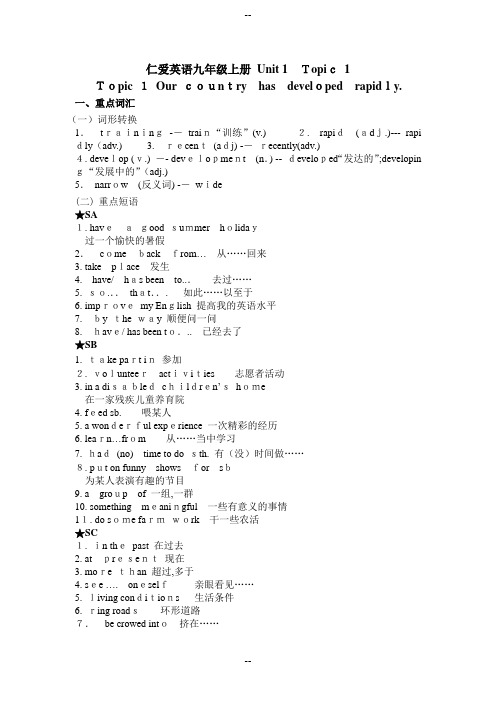
仁爱英语九年级上册Unit 1Topic1Topic 1Our country has developed rapidly. 一、重点词汇(一)词形转换1.training--train“训练”(v.)2.rapid(adj.)--- rapi dly(adv.) 3.recent(adj) --recently(adv.)4. develop (v.) -- development(n.) -- developed“发达的”;developin g“发展中的”(adj.)5.narrow(反义词) --wide(二)重点短语★SA1. haveagood summer holiday过一个愉快的暑假2.comebackfrom…从……回来3. take place发生4.have/has been to...去过……5. so...that... 如此……以至于6. improvemy English 提高我的英语水平7.by the way 顺便问一问8.have/ has been to... 已经去了★SB1. take part in参加2. volunteeractivities 志愿者活动3. in a disabledchildren’shome在一家残疾儿童养育院4. feed sb. 喂某人5. a wonderful experience 一次精彩的经历6. learn…from从……当中学习7. had(no)time to do sth. 有(没)时间做……8. put on funny showsfor sb为某人表演有趣的节目9. a group of 一组,一群10. something meaningful一些有意义的事情11. do some farmwork 干一些农活★SC1. in thepast 在过去2. atpresent现在3. more than 超过,多于4. see ….oneself亲眼看见……5. living conditions 生活条件6. ring roads环形道路7.be crowed into挤在……8. have the chanceto do sth. 有机会做某事9. receive agood education接受良好的教育10. keep in touch with sb byletter ortelegram通过书信或电报与某人取得联系11. far away遥远12.the reformand opening-up 改革开放13.tallerandbrighter 又高又明亮14. satisfy one’s needs 满足某人的需要15.not only…but also…不但……而且……16. enjoygoodmedical care享受很好的医疗保健17.what’s more 而且18. make rapid progress取得很大/快速进步19.succeedin doing sth成功地做某事20. rememberthe past 记住过去21. livein the present 立足现在22.dream about the future展望未来23. the course of……的过程★SD1. leisure activities休闲活动2.play an important part in在……中发挥重要作用3. playhide-and-seek捉迷藏4.play chess下棋5.in one'sspare/free time在某人空闲时6. spend ... on sth. 花费……在……上7. various kinds of各种各样8. both... and...不仅……而且……9. places of interest名胜古迹10.in theopen air 在户外二、重点句型。
(完整版)仁爱英语九年级上册知识点归纳
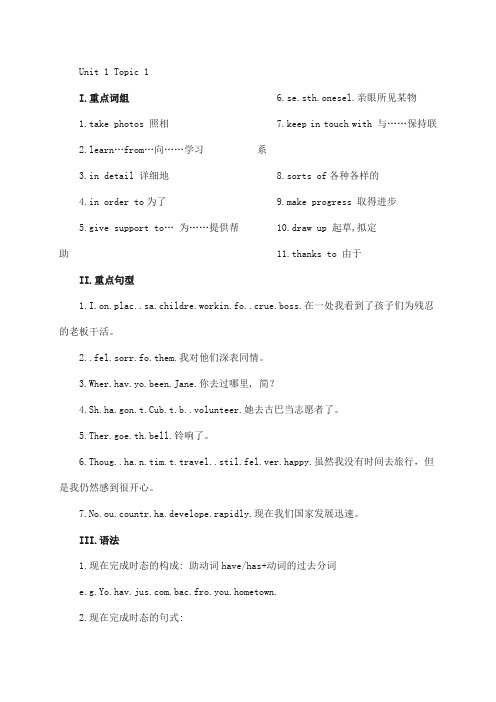
Unit 1 Topic 1I.重点词组1.take photos 照相2.learn…from…向……学习3.in detail 详细地4.in order to为了5.give support to…为……提供帮助6.se.sth.onesel.亲眼所见某物7.keep in touch with 与……保持联系8.sorts of各种各样的9.make progress 取得进步10.draw up 起草,拟定11.thanks to 由于II.重点句型1.I.on.plac..sa.childre.workin.fo..crue.boss.在一处我看到了孩子们为残忍的老板干活。
2..fel.sorr.fo.them.我对他们深表同情。
3.Wher.hav.yo.been.Jane.你去过哪里, 简?4.Sh.ha.gon.t.Cub.t.b..volunteer.她去古巴当志愿者了。
5.Ther.goe.th.bell.铃响了。
6.Thoug..ha.n.tim.t.travel..stil.fel.ver.happy.虽然我没有时间去旅行,但是我仍然感到很开心。
7.No.ou.countr.ha.develope.rapidly.现在我们国家发展迅速。
III.语法1.现在完成时态的构成: 助动词have/has+动词的过去分词.bac.fro.you.hometown.2.现在完成时态的句式:e.g.(1..hav.bee.t.Moun.Huan.wit.m.parents.(2) I haven’t seen him for a long time.(3) Where have you been?(4.——Hav.yo.eve.cleane..room?.——Yes..have..No..haven’t.3.have.ha.been.have/ha.gon.的区别have/has been to sp.表示曾经到过某地—— have/has gone to sp.表示已经去了某地e.g.(1..hav.bee.t.Moun.Huan.wit.m.parents. .(2.Sh.ha.gon.t.Cub.t.b..vo lunteer.Unit 1 Topic 2I.重点词组1. get lost 迷路2. each other 彼此3.at least 至少4take place发生5because of 因为6.b.stric.wit.sb.对某人严格要求.7.carry out 实行8.be short of 缺乏9.take measures to do sth.采取措施做某事10.be known as…作为……而著名11.work well in doing…在……方面起作用12.a couple of 一些13keep up with赶上,跟上II.重点句型1.Hav.yo.foun.hi.yet.你已经找到他了吗?2.——.reall.hat.t.g.shopping.我的确讨厌购物。
(完整版)仁爱英语九年级上册知识点归纳
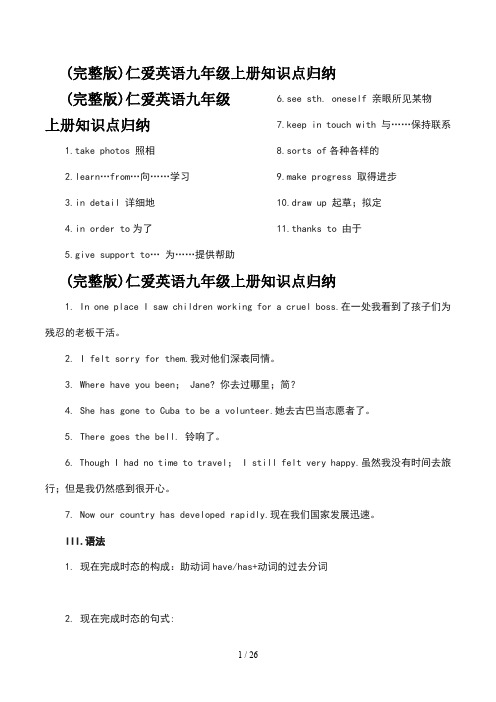
(完整版)仁爱英语九年级上册知识点归纳(完整版)仁爱英语九年级上册知识点归纳1.take photos 照相2.learn…from…向……学习3.in detail 详细地4.in order to为了5.give support to… 为……提供帮助6.see sth. oneself 亲眼所见某物7.keep in touch with 与……保持联系8.sorts of各种各样的9.make progress 取得进步10.draw up 起草;拟定11.thanks to 由于(完整版)仁爱英语九年级上册知识点归纳1. In one place I saw children working for a cruel boss.在一处我看到了孩子们为残忍的老板干活。
2. I felt sorry for them.我对他们深表同情。
3. Where have you been; Jane? 你去过哪里;简?4. She has gone to Cuba to be a volunteer.她去古巴当志愿者了。
5. There goes the bell. 铃响了。
6. Though I had no time to travel; I still felt very happy.虽然我没有时间去旅行;但是我仍然感到很开心。
7. Now our country has developed rapidly.现在我们国家发展迅速。
III.语法1. 现在完成时态的构成:助动词have/has+动词的过去分词2. 现在完成时态的句式:e.g. (1) I have been to Mount Huang with my parents.(2) I haven’t seen him for a long time.(3) Where have you been?(4) ——Have you ever cleaned a room?——Yes; I have. / No;I haven’t.3. have/ has been与 have/has gone 的区别have/has been to sp.表示曾经到过某地—— have/has gone to sp.表示已经去了某地e.g. (1) I have been to Mount Huang with my parents. (2) She has gone to Cuba to be a volunteer.Unit 1 Topic 2(完整版)仁爱英语九年级上册知识点归纳1. get lost 迷路2. each other 彼此3.at least 至少4take place发生5because of 因为6.be strict with sb. 对某人严格要求7.carry out 实行8.be short of 缺乏9.take measures to do sth.采取措施做某事10.be known as… 作为……而著名11.work well in doing…在……方面起作用12.a couple of一些13keep up with赶上;跟上(完整版)仁爱英语九年级上册知识点归纳1. Have you found him yet? 你已经找到他了吗?2. ——I really hate to go shopping. 我的确讨厌购物。
(精华版)仁爱版英语九年级上册知识点整理

(精华版)仁爱版英语九年级上册知识点整理本文档对仁爱版英语九年级上册的知识点进行整理,旨在帮助同学们快速回顾和掌握所学内容。
以下是详细的知识点整理:1. 单元一:同一种动物,不同的国家1.1 单词与短语- animal:动物- continent:大洲- natural habitat:自然栖息地- endangered species:濒危物种- behavior:行为1.2 语法与句型- 形容词比较级的构成及用法- 原因状语从句的构成及用法- 定语从句的构成及用法2. 单元二:骑乘的美丽童话2.1 单词与短语- fairy tale:童话- kingdom:王国- castle:城堡- carriage:马车- prince:王子- princess:公主- wicked:邪恶的2.2 语法与句型- 一般过去时的构成及用法- 时间状语从句的构成及用法- 分词作定语的用法3. 单元三:发掘智慧的能力3.1 单词与短语- wisdom:智慧- knowledge:知识- invent:发明- experiment:实验- curiosity:好奇心- observe:观察3.2 语法与句型- 基数词与序数词的用法- 短语动词的构成及用法- 形容词作定语的用法4. 单元四:人人都是明星4.1 单词与短语- superstar:超级明星- talent:才能- concert:音乐会- audience:观众- performance:表演- fame:名声4.2 语法与句型- 定语从句的引导词与用法- 形容词与副词的比较级与最高级的构成及用法- 双重否定的句子构成及用法以上是对仁爱版英语九年级上册的知识点进行的精华整理,希望能对同学们的学习有所帮助。
更详细的内容请参考教材。
- 1、下载文档前请自行甄别文档内容的完整性,平台不提供额外的编辑、内容补充、找答案等附加服务。
- 2、"仅部分预览"的文档,不可在线预览部分如存在完整性等问题,可反馈申请退款(可完整预览的文档不适用该条件!)。
- 3、如文档侵犯您的权益,请联系客服反馈,我们会尽快为您处理(人工客服工作时间:9:00-18:30)。
九年级仁爱版Unit2——Unit4知识点U2 Topic 2 I. 重点词组1. as a result结果2. here and there到处3. in the beginning 一开始4. in danger 处于危险中5. cut down砍倒6. change sth. into sth.把……变成……7. prevent from防止8. greenhouse effect温室效应9. refer to提到10.deal with 处理11.take up 占据12.cut off中断II. 重点句型1. As we know, none of us likes pollution. 众所周知,没有人喜欢污染。
none与no one 的区别:a)none “全无”,既可指人也可指物,后常跟of 的短语; 作主语时,谓语动词既可用单数也可用复数;no one只指人,后不能跟of 的短语; 作主语时,谓语动词只用作单数。
如:He has read none of these books.(指物)这些书他一本都没看过。
None of my friends like/ likes drawing.(指人)我的朋友们没有一个喜欢画画。
No one is here.没有一个在这儿。
b)none回答how many/ much的问题;no one回答who的问题。
如:A: How many students come to school by taxi? B: None.有多少的学生搭出租车来上学?没有人。
A: How much water is there in the bottle? B: None.瓶子里有多少水?一点儿也没有。
A: Who is in the room? B: No one.谁在房中?没有人。
2、Trees can also stop the wind blowing the earth away.树木也能防风固土。
stop / prevent sb. /sth. (from ) doing sth. 阻止/ 防止某人或某物做某事keep sb./sth. from doing sth. 阻止/ 防止某人或某物做某事3、You may either take a bus or a taxi. 你们可能搭公车去或者是搭出租车去。
a) either…or…“要么……要么……; 或者……或者……”并列连词,连接对等结构;连接主语时,根据就近原则。
如:You may come either today or tomorrow. 你要么今天来,要么明天来。
We can either sing or dance. 我们可以唱歌或者跳舞。
Either you or he is right. 要么你对,要么他对。
b) either 单独使用时,是代词,表“二者之一”既可指人也可指物;用作主语时,谓语动词用作单数。
如:A:Would you like coffee or tea? B: Either is OK你想要咖啡还是茶?随便都可以。
Either of us is right. 我们俩中有一人是对的。
III. 语法不定代词和不定副词:(一) 不定代词:指人:someone/ somebody anyone/ anybody no one/ nobody everyone/everybody 指物:something anything nothing everything(二)不定副词指地点:somewhere anywhere nowhere everywhere(三)用法:1.some-复合代词/副词常用于肯定句;如:I saw someone in the room. 我看见房间里有人。
There is something in the woods. 树林里有什么东西。
2、any-复合代词/副词常用于否定句或疑问句;如:I didn’t see anyone in the room. 我没看见有人在房间里。
There isn’t anything in the woods. 树林里没有什么东西。
3、no- 复合代词/副词表全否定;如:I saw nobody in the room. 我看见房间里没有人。
There is nothing in the woods. 树林里没有什么东西。
4、·every- 复合代词/副词代替全部;如:Everyone is here. 大家都在这儿。
It seems he knows everything. 似乎他知道一切。
※some-复合代词/副词用于疑问句中时,表希望得到对方的肯定回答或表请求;如:Would you like something to drink? 你要点喝的东西吗?※any-复合代词/副词用于肯定句时,表“任何”;如:If people spit anywhere in public, they should be punished.如果人们在公众的任何地方吐痰,他们应该受罚。
※不定代词作主语时,谓语动词用单数形式;如:No one knows this secret. 没有一人知道这个秘密。
Everything goes well. 一切进展顺利。
※如果有定语修饰,定语应放在不定代词或不定副词后;如:I have something important to tell you. 我有重要的事告诉你。
There is nobody strange here. 这儿没有一个陌生人。
※no= not any →nobody = not anybody; nothing = not anythingShe did n’t say anything. = She said nothing. 她什么也没说。
There is nobody strange here.= There is n’t anybody strange here.这儿没有一个陌生人。
Topic 3I. 重点词组1. not only…but also…不仅……而且……2. be supposed to 应该3. ought to 应该4. turn off关掉5. instead of代替6. on time准时7. make sure 确保8. push forward向前推9. push down向下10.pull up向上拉11、encourage sb to do sth 鼓励某人做某事12、after all 毕竟above all 最重要的是......II. 重点句型1.We should use both sides of paper, and reuse plastic bags rather than throw them away. 我们应该把纸的两面都使用,将塑料袋再次使用而不是轻易扔掉。
a)both 修饰复数名词;而either 修饰单数名词;如:There are a lot of trees on both sides of the road.= There are a lot of trees on either side of the road. 在路的两边有许多树。
b)rather than 表“(是)……而不是”;连词, 连接对等结构, 相当于instead ofc)如: I like coffee rather than tea. = I like coffee instead of tea.我喜欢咖啡而不是茶.He likes listening to music rather than/ instead of singing.他喜欢听音乐而不是唱歌.He wants to go today rather than/ instead of tomorrow.他想今天走而不明天.I did my homework rather than watched TV.= I did my homework instead of watching TV.昨晚我做作业了而不是看电视.但rather than位于句首时, 后跟动词原形,它不受句中谓语动词的时态影响。
如:Rather than do it by myself, I didn’t ask for help.宁可自己干, 我没请人帮忙。
2.Everyone is supposed to do it. 每个人都应该那样做。
be supposed to do sth.指(按规定、习惯、安排等)应当做某事;必须做某事;相当于should; 用于否定句时,表“允许”;如:Teachers are supposed to/ should know a lot. 老师应该知道很多。
You are not supposed to smoke here. 这里不允许抽烟。
3. First, you ought to turn off the lights when you leave a room.首先,当你离开房间的时候,应该随手关灯。
ought to 情态动词, 表“应该; 应当”; 语气比should 强;指道义上应该做的事,有时含有责备或督促的语气。
should 指主观上感到有责任或义务去做。
如:You ought to help your mother do some housework.你应该帮你妈妈做些家务。
We should study hard.我们应该努力学习。
其否定式和疑问式:You oughtn’t to get up so late in the morning.你早晨不应该起这么晚。
Ought I to tell her the bad news? 我该告诉她坏消息吗?Yes, you ought. No, you oughtn’t.III. 语法并列句:由两个或两个以上并列而又相互独立的简单句构成。
结构为:简单句+并列连词+简单句常用的并列连词有:and, or, but, while, not only… but alsoe.g. 1. The river is dirty and the temperature of the earth is rising.2. They work well, but they are slow and can’t run for long.Unit 3Topic1一.重点词语1.be able to=can能够,会2.can’t wait to do sth.迫不急待地做某事3.have a (good) chance to do sth.有(好)机会做某事4.practice doing sth.练习做某事5.be made by…被……制做;be made of/from…由……制成;be made in…在某地制造6.on business出差7.be similar to…和……相似8.translate…into…把……翻译成……9.have no/some trouble (in) doing sth.做某事没有/有些困难10.once in a while=sometimes/at times偶尔,间或11.whatever=no matter what无论何时12.as well as以及13.mother tongue 母语14.take the leading position处于领先地位15.encourage sb. to do sth.鼓励某人做某事16.call for号召二.重点句型1.Disneyland is enjoyed by millions of people from all over the world.世界上数以百万的人们都喜欢迪斯尼乐园。
